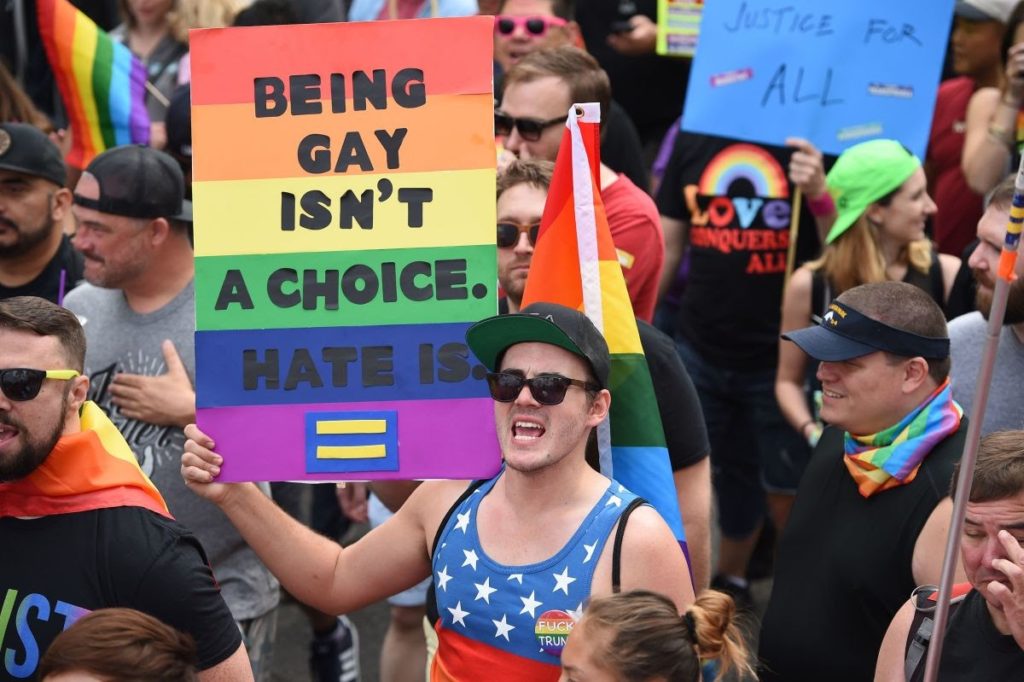LGBTQ+ Mental Health Matters

Image Courtesy of Pacific Standard
By Katie Van Lew
Every Tuesday at 3 p.m., The Center for Cultural Engagement (CCE) hosts its “Civility Dialogues” series, where students, supervised by a coordinating faculty member, are able to engage in civil discourse, all while supporting, and celebrating the unique identities of the individual.
This week, the CCE hosted an event to discuss the mental health impacts on the LGBTQ+ community. The discussion was led by Emily D’Antonio, the President of CUAllies and Marina Massaroni, the vice president and communications director of CUAllies. CUAllies is Catholic University’s LGBTQ+ group in which the community can collectively come together to support one another on their individual journey regarding sexual orientation and gender identity. Additionally, the CUAllies were joined by Candace Koman, an intern at the counseling center as well as a co-leader of the Mosaic group, which supports the LGBTQ+ students on campus.
In recent years, conversations regarding mental health have become more of a prevalent and pressing concern among people. In an ongoing study collected by National Vital Statistics Report, from 2007 to 2018, suicide rates have grown astronomically for those aged 10-24 years old; specifically, the rates have grown about 57% in 9 years. Although mental health all people, the statistics gathered in studies more often than not exclude members of the LGBTQ+ community.
During the presentation, D’Antonio and Massaroni discussed the alarming statistics in which the LGBTQ+ community is detrimentally affected. In the LGBTQ+ community, there are significant disparities in how these individuals are affected compared to heterosexual individuals. Studies show that members of this community are oftentimes at a higher risk for severe mental health impact, including the development of depression and anxiety. Specifically, LGBTQ+ individuals are twice as likely to develop these disorders, while transgender people are four times as likely.
While conducting her research, D’Antonio came across the Minority Stress Theory which y outlines how chronic stress afflicts people in minority communities like the LGBTQ+ community. The theory corroborates the stigmatization of the queer community and has three main factors that contribute to this theory: external stressors, expectations that victimization will occur, and internalization of these negative social attitudes.
“What happens with that [Minority Stress Theory] is that when everything becomes very anxiety and stress-inducing,” Koman said. “That fight or flight sense is constantly engaged. So things like going to the bathroom, walking down the street, going to work, going to school, things that might feel like a simple task for non-queer people end up being incredibly stressful, incredibly fear-inducing, and having that sort of chronic stress on one’s body can be really problematic and lead to physical and mental health concerns down the line.”
Mental health in the queer community is often worsened due in part to intolerance and prejudice from communities that do not accept nor understand their identity. Members of the community are more prone to attacks, including various forms of discrimination, including but not limited to misgendering transgender persons, stereotyping, as well as verbal, physical, and mental abuse.
D’Antonio describes the grievous implications of inadequate support systems.
“A lot of times, not everyone has a good support system so LGBTQ+ youths and youths in general will sometimes rely on substance abuse such as alcoholism, nicotine addictions which occur at much higher rates in the LGBTQ+ community as opposed to their straight counterparts,” D’Antonio said. “Homelessness is a huge problem in the community along with suicidal ideations, attempts, and completions. They all occur at a much higher rate in the queer community than in the straight community.”
The injustices imparted on some members of the LGBTQ+ community are not always from a stranger passing by on the street, but more frequently, individuals are harassed by people they know. About 57% of individuals in the community are harassed by their family and friends. However, the issue is not limited to verbal attacks. More than half of the individuals who identify as LGBTQ+ are sexually harassed, as well as violently attacked due to their sexual orientation and or gender identity.
“It is important to keep in mind that no matter what we need to support them,” Massaron said. “Just because someone might have a different experience from us doesn’t mean that homophobia, transphobia, and overall harassment and hate crimes are okay. They aren’t, and they need to be taken more seriously, and we as allies, and we as other people in the queer community need to be supportive to everyone and everyone in different communities too.”
To purposefully neglect a group of marginalized people, such as those of the LGBTQ+ community is contradictory to the Catholic faith. There are countless ways in which the non-queer community can show support, by (but not limited to) offering safe spaces for individuals to express themselves, offering affirmations, and refusing to tolerate hate. If you are struggling, The Trevor Project, as well as the Centers for Disease Control and Prevention have many helpful resources to support LGBTQ+ individuals in their journey. In addition to these resources, the counseling center hosts the Mosaic LGBTQ+ support group on Thursdays from 5:10 p.m. to6:30 p.m. for members of the community who are interested in learning about more resources and lively discussion involving mental health and the wellbeing of the individual.
To learn more about and join CUAllies, reach out to the organization via email at [email protected], or visit their social media page using the handle @CUAllies on Facebook, Instagram, and Twitter.





